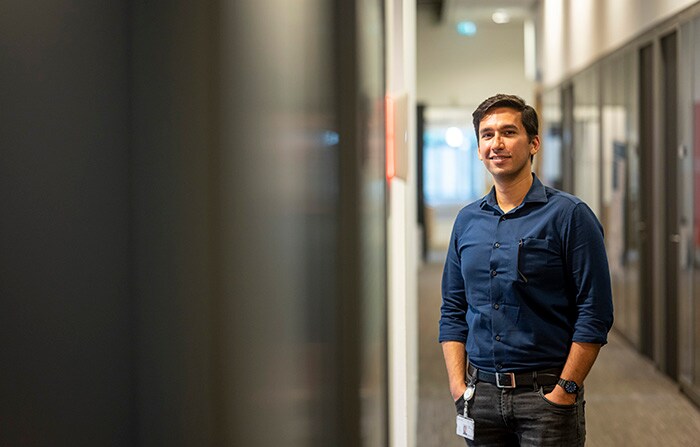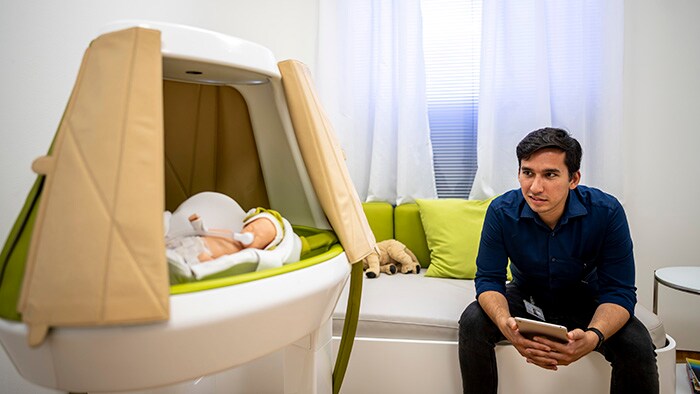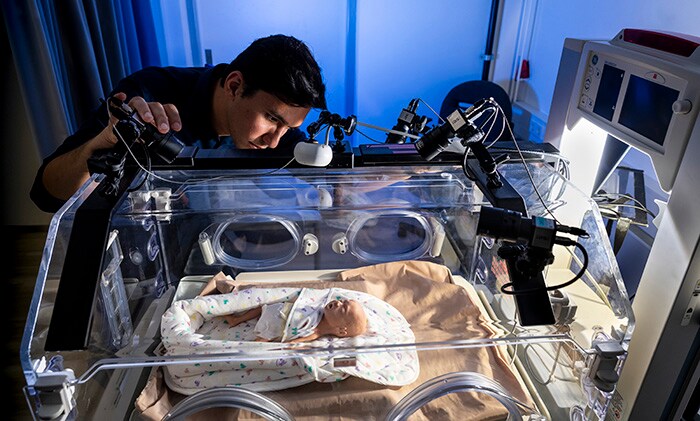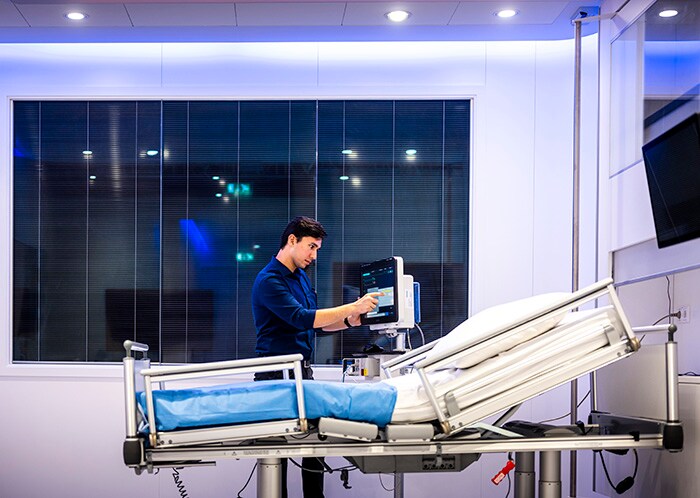Blog
Share on social media
'The boy who cried wolf', how can we solve alarm fatigue on ICU?
In Intensive Care environments, alarms function as 'attention redirection systems'; they let a nurse or doctor know that a patient might be in need of urgent or additional care. In practice, however, there are simply too much alarms. That is when ‘the boy who cried wolf’-effect comes into action: alarms are not taken as seriously as they should. Rohan Joshi (30) researched this issue in his PhD, which he did under the umbrella of the Eindhoven MedTech Innovation Center (e/MTIC). Now, as a scientist at Philips, he helps to improve predictive monitoring of premature infants. "R&D is something that is in the DNA of Philips. Only in Eindhoven we already have hundreds of scientists working at the High Tech Campus, which makes it easier to learn from each other."

You obtained your bachelor in Biomedical Engineering in Manipal, India and decided to do your masters in Leuven. Why Belgium?
"Studying abroad is something that I always wanted since high school. Most of my friends went to the US, but I found Europe more appealing because of its culture diversity. In India people often think that Europe is one coherent culture, but in reality it is a potpourri. Even Belgium and the Netherlands differ a lot, while they share a border. In my experience, the Dutch tend to focus more on the commercial side of research. To me, that was positive, because that was something that I wanted to focus on in my PhD."
In my experience, the Dutch tend to focus more on the commercial side of research. To me, that was positive, because that was something that I wanted to focus on in my PhD.
Rohan Joshi
Scientist
When did you first get in touch with Philips?
"That was in 2013, and it was more or less by accident. I was about to start an internship at the university. When my supervisor fell sick, I got the opportunity to switch to Philips and do an internship on the predictive monitoring of heart failure patients that were tele-monitored from home. I tried to develop an algorithm for detecting heart failure deterioration requiring rehospitalization. Five years later, when I obtained my PhD, I was eager to join Philips as an employee, because I had an insider experience of what it's like to work here and felt immediately at home." "I like the freedom and creativity of research, so pursing a research-related career is a natural fit for me. However, as opposed to academic research, on average, industrial research has a clearer pathway towards commercial applications and I find that attractive."
You were one of the first PhD candidates in the e/MTIC program. What was your research about?
"Initially, it was quite broad. I started doing research on predictive monitoring of premature infants in one of the e/MTIC hospitals. Along the way I narrowed it down. One of the topics that I researched was a data-driven approach to predictive monitoring. What's interesting about newborns is that you can only rely on observation and electronic patient monitoring to assess how they are doing, you can't ask babies how they feel. When I visually noticed that infants in Neonatal Intensive Care Units (NICU's) are always moving around, I thought; why don't we try to capture this? There has to be value in gathering data on the physical activity of infants. I looked at literature and it was confirmed that there is lots you can do with these data. For example, I studied babies with sepsis at the hospital. When adults feel sick, what they tend to do is lie still in bed. With babies it is the same; they move less when they are not doing well. If you monitor their movements and you can see that they are less active than normal, you can develop an attention redirection system to inform nurses to check on the patient."

Actually, another part of your thesis was about these 'attention redirection systems', or alarms, right?
"Absolutely. In a NICU you will sometimes hear hundreds of alarms every hour. That's a lot of noise, and it's impossible to react to them all. The result is that you get alarm fatigue; people stop reacting to these alarms. Part of my research was to find ways to reduce the number of non-actionable alarms."
In a NICU you will sometimes hear hundreds of alarms every hour. That's a lot of noise, and it's impossible to react to them all.
Rohan Joshi
Scientist

This research made the news big time, including an interview with the Dutch national broadcaster NOS; how did that make you feel?
"To be honest, I didn't quite know how big that was until people told me. Before I defended my thesis at the TU/e, I wrote an article about alarm fatigue, comparing it with the story of the boy who cries wolf. If you cry wolf too often while there is nothing wrong, people stop responding to you. That is what happens with false alarms as well. This article caught the attention of a journalist at the NOS, which eventually led to a TV interview. When I heard from friends that they saw me on TV, I realized that it was kind of special."
I wrote an article about alarm fatigue, comparing it with the story of the boy who cries wolf. If you cry wolf too often while there is nothing wrong, people stop responding to you. That is what happens with false alarms as well.
Rohan Joshi
Scientist
What is your role within Philips?
"Part of my time I still work on neonatal research, so it's a kind of continuation of my work as a PhD. The rest of the time I spend on hemodynamic monitoring. We are developing an ultrasound sensor that you can attach on your neck to measure cardiac output in a non-invasive way. What I particularly like about this, is that we work in a team. As a PhD you work individually, but I prefer teamwork. Finally, I also supervise a PhD student who is part of e/MTIC."

Why are ecosystems such as e/MTIC so important?
"Basically, I see e/MTIC as tying together preexisting collaborations into a more formal ecosystem. For Philips, I see this as a unique opportunity to benefit from outside-in innovation, knowledge and talent by harnessing academic and clinical ecosystems. From a different perspective, PhD projects are at least four years long and that continuity is valuable in complimenting some of the shorter-term initiatives within Philips. On a broader scale, there is synergistic value in academia, industry and hospitals working together. After all, these are not disparate entities, rather they all work towards improving health and wellbeing, merely from differing positions of strength and with differing priorities. So, tying them together into a collaboration is an obvious choice."
There is synergistic value in academia, industry and hospitals working together. After all, these are not disparate entities, rather they all work towards improving health and wellbeing, merely from differing positions of strength and with differing priorities. So, tying them together into a collaboration is an obvious choice.
Rohan Joshi
Scientist
What do you like about working at Philips?
"Philips has been around for a very long time, it was founded in 1891. If you look at other companies from that era, you hardly see any examples of companies that continuously managed to switch to different markets and areas while maintaining a central, corporate research lab. R&D is something that is in the DNA of Philips. We spend approximately 10 per cent of our revenue on R&D every year, about 1,9 billion Euro in 2019. In Eindhoven you will find hundreds of scientists and we are all in one place. In most other large organizations you will find research decentralized and located only within the business, so it's much harder to interact with one another and to learn from each other. I think the advantages of having R&D concentrated are not always fully appreciated. It is something that is quite unique."
